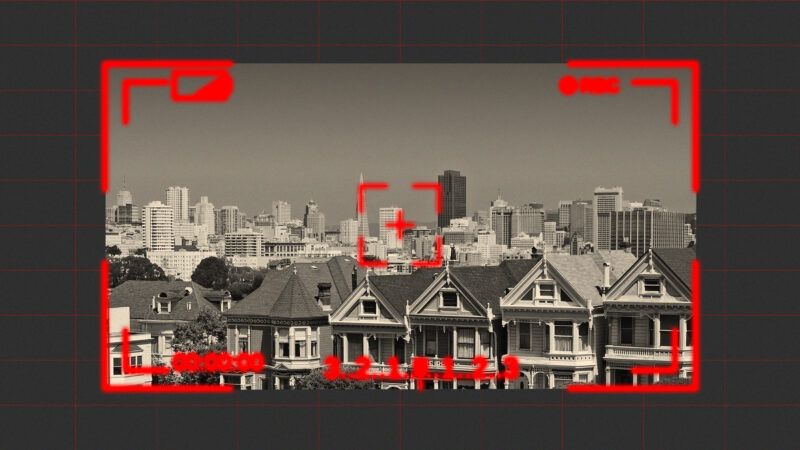San Francisco Police Can Now Have Live Access to Nearly Any Camera in the City
A new ordinance passed by the city's Board of Supervisors allows police to request live access to private security cameras even for misdemeanor violations.

Law enforcement access to certain private data, like surveillance camera footage, typically requires a warrant. But increasingly, police are finding ways around that requirement. For owners of Amazon's popular Ring video doorbells, police can submit an "emergency request" to get access to a customer's stored footage without the customer's permission. Now, in San Francisco, police can get live access to private security cameras, even if no crime has been committed.
Last week, the city's Board of Supervisors passed an ordinance regulating San Francisco Police Department (SFPD) access to private security cameras, including those put up by homeowners on their own property. The new policy establishes a 15-month pilot program, which would allow the SFPD to "temporarily live monitor activity during exigent circumstances, significant events with public safety concerns, and investigations relating to active misdemeanor and felony violations" as well as "gather and review historical video footage for the purposes of conducting a criminal investigation."
Nominally, the proposal is supposed to help ameliorate police staffing issues: By the end of the year, SFPD expects to be more than 800 officers short, which constitutes more than a third of a fully staffed police force. But Supervisor Dean Preston disagreed, stating that the Board of Supervisors "handed $50 million extra in increases to the police department this year, with no real showing of need, because they were so supposedly understaffed." Now, he says, not only does the SFPD need the extra $50 million, "but they have to have dramatically expanded surveillance rights because they're theoretically understaffed. That really doesn't resonate with me."
Privacy advocates opposed the measure as well. Jennifer Jones, an attorney with the Northern California chapter of the American Civil Liberties Union (ACLU), told ABC 7 News that California misdemeanors include "posting an ad on city and county property without authorization, [or] disturbing a religious [service] with rude or indecent behavior." SFPD could theoretically seek live access to private security camera feeds in either case. As Matthew Guariglia, a policy analyst at the Electronic Frontier Foundation (EFF), wrote, "misdemeanors like vandalism or jaywalking happen on nearly every street of San Francisco on any given day."
Previously, under a 2019 ordinance, officers were only permitted access to live camera footage without a warrant under "exigent circumstances," which it defined as "an emergency involving imminent danger of death or serious physical injury." In December, Mayor London Breed complained that this minor stipulation "hobbled law enforcement when confronting life-threatening incidents like active shooters, suspected terrorist events, hostage taking, kidnapping, natural disasters, or looting." Breed does not detail any such cases of terror, hostage, or kidnapping events since the 2019 ordinance was passed, and there is notably a major difference between those situations and looting. She further wrote that the ordinance should be modified "to clarify that peace officers are allowed to access live-feed and in[-]real-time surveillance technologies when necessary to maintain public safety." District Attorney Brooke Jenkins indicated her office supported the measure, saying it could "help address the existence of open-air drug markets fueling the sale of the deadly drug fentanyl."
Breed and a city supervisor submitted similar proposals before ultimately agreeing to the current version after negotiating with the SFPD.
Notably, the final version of the proposal requires the camera owner's "express consent." But once access is granted, SFPD can continue streaming live for up to 24 hours. And there are a worrying number of justifications the department can cite, including "Significant Events" for "placement of police personnel due to crowd sizes."
According to a 2020 lawsuit, SFPD "acquired, borrowed, and used a private network of more than 400 surveillance cameras" to snoop on Black Lives Matter protests. This directly violated the city ordinance passed less than a year earlier, which limited police access only to extremely limited, severe circumstances. Prior to the 2019 policy, SFPD did the same thing in order to surveil Pride parades and Fourth of July celebrations.



Show Comments (50)